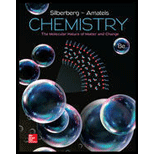
(a)
Interpretation:
The mass of calcium sulfate from the scrubbing 4 GL of flue gas is to be calculated.
Concept introduction:
The expression to calculate the partial pressure of the gas is as follows:
Pgas=Xgas⋅Ptotal
Here, Pgas is the partial pressure of the gas, Xgas is the mole fraction of the gas and Ptotal is the total pressure.
The expression to calculate the mole fraction of the gas is as follows,
Xgas=Moles of gasTotal moles
Here, Xgas is the mole fraction of the gas.
The ideal gas equation can be expressed as follows,
PV=nRT
Here, P is the pressure, V is the volume, T is the temperature, n is the mole of the gas and R is the gas constant.
(a)
Answer to Problem 5.139P
The mass of calcium sulfate from the scrubbing 4 GL of flue gas is 4 kg.
Explanation of Solution
The concentration of SO2 is 1000 times higher than its mole fraction in clear dry air that is 2×10−10. Thus, the mole fraction of SO2 equals to 2×10−7.
The expression to calculate the volume of SO2 is as follows:
Volume of SO2 removed=[(mole fraction of SO2)(volume of flue gas)(percentage of SO2 removes)] (1)
Substitute the value 2×10−7 for mole fraction of SO2, 4 GL for the volume of flue gas and 95 % for a percentage of SO2 removes in the equation (1).
Volume of SO2 removed=[(2×10−7)(4 GL(109 L1 GL))(95 %100 %)]=760 L
The formula to convert
Substitute
The expression to calculate the moles of the
Here,
Rearrange the equation (3) to calculate
Substitute the value
The equation for the reaction of
The equation for the reaction of
From the equation (5), one mole of the
Substitute the value
The expression to calculate the mass of
Rearrange the expression to calculate the mass of
Substitute the value
The mass of calcium sulfate from the scrubbing
(b)
Interpretation:
The volume of air at
Concept introduction:
The ideal gas equation can be expressed as follows,
Here,
(b)
Answer to Problem 5.139P
The volume of air at
Explanation of Solution
From the equation (6), one mole of the
Substitute the value
The formula to convert
Substitute
The expression to calculate the volume of
Here,
Rearrange the equation (7) to calculate
Substitute the value
The expression to calculate the volume of air is as follows:
Substitute the value
The volume of air at
Want to see more full solutions like this?
Chapter 5 Solutions
Chemistry: The Molecular Nature of Matter and Change
- (ME EX1) Prblm #9/10 Can you explain in detail (step by step) I'm so confused with these problems. For turmber 13 can u turn them into lewis dot structures so I can better understand because, and then as well explain the resonance structure part. Thanks for the help.arrow_forwardProblems 19 and 20: (ME EX1) Can you please explain the following in detail? I'm having trouble understanding them. Both problems are difficult for me to explain in detail, so please include the drawings and answers.arrow_forward(ME EX1) Prblm #4-11 Can you please help me and explain these I'm very confused in detail please. Prblm number 9 I don't understand at all (its soo confusing to me and redraw it so I can better depict it).arrow_forward
- ME EX1) Prblm #19-20 I'm so confused with these problems. Can you please help me solve them and explain them? Problems number 19-20, and thanks! step by step and in detail for me please helparrow_forwardCalculate the flux of oxygen between the ocean and the atmosphere, given that: Temp = 18°C Salinity = 35 ppt Density = 1025 kg/m3 Oxygen concentration measured in bulk water = 263.84 mmol/m3 Wind speed = 7.4 m/s Oxygen is observed to be about 10% initially supersaturatedarrow_forward( ME EX1) Prblm 27-28: Can you explain to me both prblms in detail and for prblm 28 what do you mean bi conjugated bi ponds and those structures I'm confused...arrow_forward
- A. Determine the number of electrons in a system of cyclic conjugation (zero if no cyclic conjugation). B. Specify whether the species is "a"-aromatic, "aa"-anti-aromatic, or "na"-non-aromatic (neither aromatic nor anti-aromatic). (Presume rings to be planar unless structure obviously prevents planarity. If there is more than one conjugated ring, count electrons in the largest.) 1. A.Electrons in a cyclic conjugated system. 18 B.The compound is (a, aa, or na) a 2. A.Electrons in a cyclic conjugated system. 10 B.The compound is (a, aa, or na) naarrow_forwardWater is boiling at 1 atm pressure in a stainless steel pan on an electric range. It is observed that 2 kg of liquid water evaporates in 30 min. Find the rate of heat transfer to the water (kW).arrow_forwardCould you please turn this into a complete Lewis dot structure formula for me so I can visualize it more clearly? and then do the explaining for the resonance structures that were given please.arrow_forward
- Could you please turn this into a complete Lewis dot structure formula for me so I can visualize it more clearly? and then do the explaining for the question.arrow_forwardplease solve. If the answer is "no error" and it asks me to type something, and i typed a-helix, its always wrong.arrow_forwardCan you please solve and explain this for me in a simple way? I cant seem to comprehend this problem.arrow_forward
 ChemistryChemistryISBN:9781305957404Author:Steven S. Zumdahl, Susan A. Zumdahl, Donald J. DeCostePublisher:Cengage Learning
ChemistryChemistryISBN:9781305957404Author:Steven S. Zumdahl, Susan A. Zumdahl, Donald J. DeCostePublisher:Cengage Learning ChemistryChemistryISBN:9781259911156Author:Raymond Chang Dr., Jason Overby ProfessorPublisher:McGraw-Hill Education
ChemistryChemistryISBN:9781259911156Author:Raymond Chang Dr., Jason Overby ProfessorPublisher:McGraw-Hill Education Principles of Instrumental AnalysisChemistryISBN:9781305577213Author:Douglas A. Skoog, F. James Holler, Stanley R. CrouchPublisher:Cengage Learning
Principles of Instrumental AnalysisChemistryISBN:9781305577213Author:Douglas A. Skoog, F. James Holler, Stanley R. CrouchPublisher:Cengage Learning Organic ChemistryChemistryISBN:9780078021558Author:Janice Gorzynski Smith Dr.Publisher:McGraw-Hill Education
Organic ChemistryChemistryISBN:9780078021558Author:Janice Gorzynski Smith Dr.Publisher:McGraw-Hill Education Chemistry: Principles and ReactionsChemistryISBN:9781305079373Author:William L. Masterton, Cecile N. HurleyPublisher:Cengage Learning
Chemistry: Principles and ReactionsChemistryISBN:9781305079373Author:William L. Masterton, Cecile N. HurleyPublisher:Cengage Learning Elementary Principles of Chemical Processes, Bind...ChemistryISBN:9781118431221Author:Richard M. Felder, Ronald W. Rousseau, Lisa G. BullardPublisher:WILEY
Elementary Principles of Chemical Processes, Bind...ChemistryISBN:9781118431221Author:Richard M. Felder, Ronald W. Rousseau, Lisa G. BullardPublisher:WILEY





